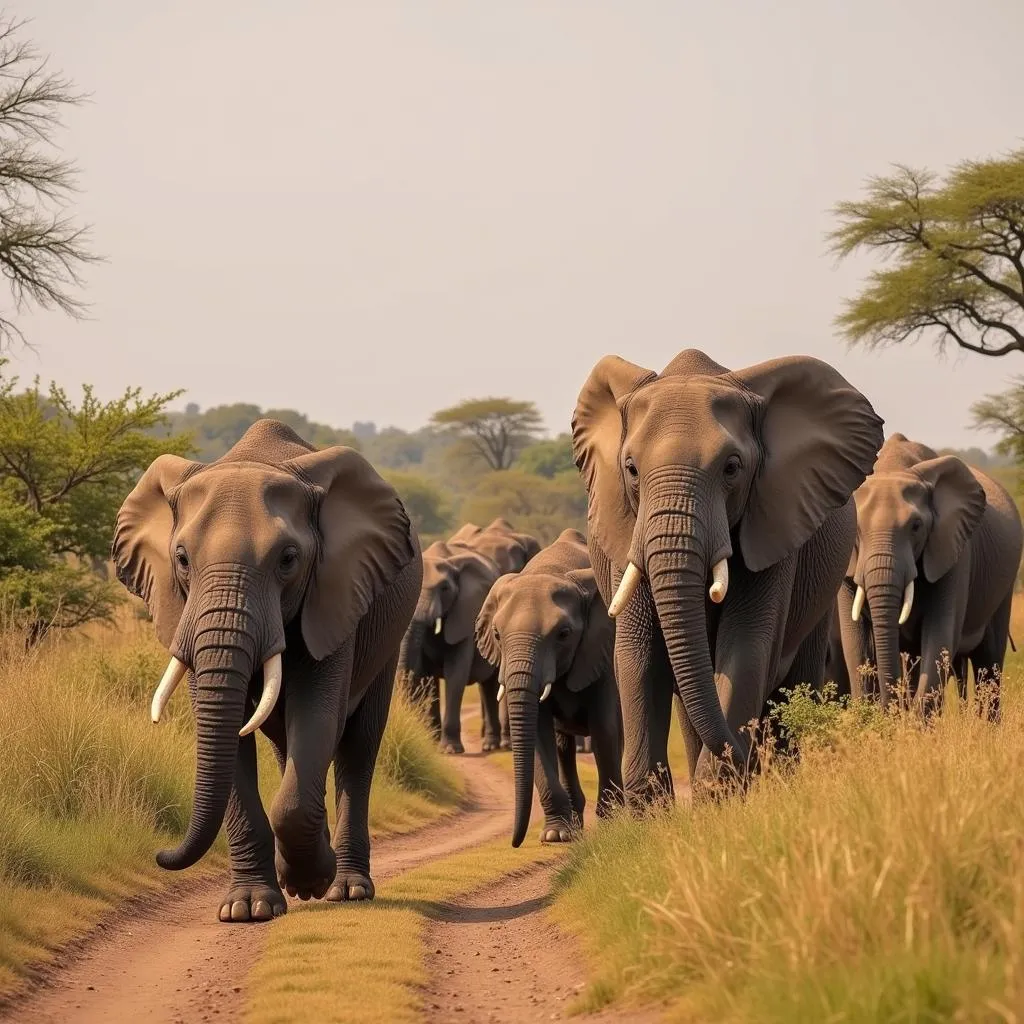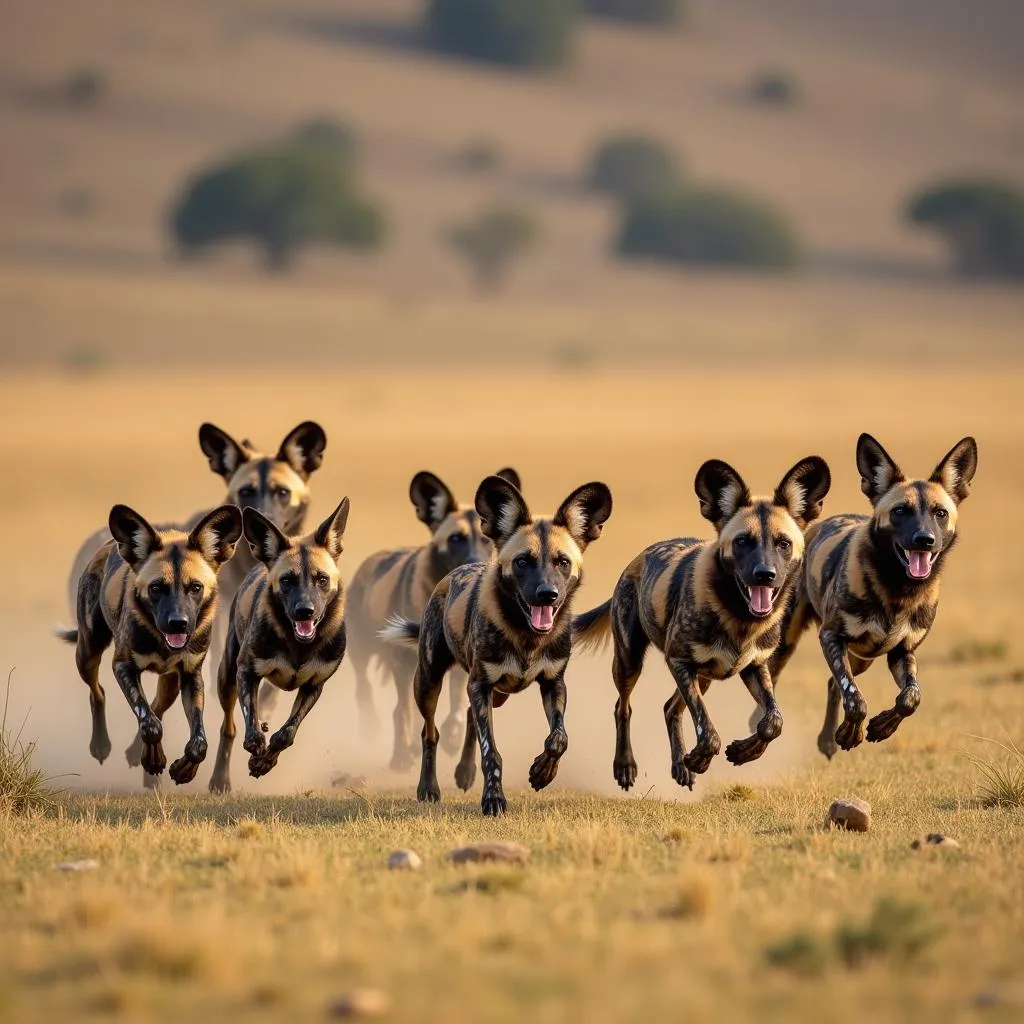African Animals List and Facts: A Safari Through the Savanna and Beyond
Africa: the very name conjures images of vast savannas teeming with life, dense jungles echoing with unseen creatures, and arid deserts where survival takes on a whole new meaning. At the heart of this diverse continent thrives a collection of animals so unique and diverse, it easily ranks as one of the most captivating on Earth. This is the ultimate guide to the African Animals List And Facts that make this continent a true marvel of the natural world.
Unveiling the Diversity of the African Animal Kingdom
From the iconic Big Five to lesser-known creatures, the African continent boasts an astounding array of wildlife. Spanning across a wide range of ecosystems, these animals have adapted to thrive in diverse environments, showcasing nature’s incredible ability to evolve and survive.
The Big Five: Icons of the African Wilderness
No African animals list would be complete without mentioning the Big Five: lions, elephants, leopards, rhinoceroses, and Cape buffalos. These magnificent creatures have earned their iconic status not just for their size and power but also for the challenges they presented to early hunters and explorers.
-
Lions: Known for their majestic manes and bone-chilling roars, lions are apex predators ruling the savannas. Their social structure, with prides led by alpha females, is a testament to their complex social intelligence.
-
Elephants: The largest land animals on Earth, African elephants are gentle giants with incredible memory and social bonds. Their matriarchal societies, where the oldest and wisest female leads the herd, highlight their intricate social dynamics.
-
Leopards: Masters of stealth and camouflage, leopards are solitary hunters with an impressive ability to adapt to various habitats. Their elusive nature and striking beauty add to their allure.
-
Rhinoceroses: These armored giants, both black and white rhinoceroses, play a crucial role in maintaining the balance of their ecosystems through their grazing habits. Their horns, tragically sought after in the illegal wildlife trade, are a testament to the urgent need for conservation.
-
Cape Buffalos: Often underestimated, Cape buffalos are formidable creatures known for their unpredictable nature and powerful horns. Their strong herd instincts and defensive formations make them a force to be reckoned with.
 African Elephant Herd
African Elephant Herd
Beyond the Big Five: Exploring the Rich Tapestry of African Wildlife
While the Big Five may steal the spotlight, the true magic of the African animal kingdom lies in its incredible biodiversity.
-
Grazing Giants: Zebras, with their distinctive stripes, and giraffes, gracefully reaching towering heights, add to the spectacle of the savannas. Their presence shapes the landscape and provides a source of wonder for anyone lucky enough to witness their migrations.
-
Primates of the Jungle: From the playful chimpanzees to the enigmatic gorillas, Africa’s primates offer a glimpse into our own evolutionary past. Their intelligence, social structures, and tool-using abilities continue to fascinate scientists and nature enthusiasts alike.
-
Predators in the Shadows: Beyond the lions, a host of predators prowl the African wilderness, each with its unique hunting strategies and ecological niche. Cheetahs, the fastest land animals, rely on bursts of speed, while African wild dogs, with their cooperative hunting techniques, showcase the power of teamwork.
-
Hidden Wonders: From the smallest insects to the nocturnal creatures of the night, the African animal kingdom is full of hidden wonders waiting to be discovered. Dung beetles, essential for nutrient cycling, and pangolins, with their unique scales, highlight the incredible diversity that often goes unnoticed.
 African Wild Dog Pack on the Hunt
African Wild Dog Pack on the Hunt
Facing the Challenges: Conservation in Action
The remarkable diversity of African animals faces unprecedented threats, from habitat loss and poaching to climate change. Conservation efforts are crucial to ensure the survival of these incredible creatures for generations to come.
-
Protecting Habitats: Establishing and maintaining national parks and wildlife reserves are essential to safeguarding crucial habitats and creating safe havens for vulnerable species.
-
Combating Poaching: Strengthening anti-poaching patrols, implementing stricter wildlife trade regulations, and raising awareness about the devastating impacts of the illegal wildlife trade are vital steps in protecting endangered species.
-
Empowering Communities: Supporting sustainable livelihoods for communities living alongside wildlife is crucial to fostering coexistence and reducing human-wildlife conflict.
Experiencing the Magic: Planning Your African Adventure
There’s no better way to witness the splendor of African animals than through an unforgettable safari experience.
-
Choosing Your Destination: From the vast Serengeti plains to the lush rainforests of Rwanda, Africa offers a diverse range of safari destinations, each with its unique wildlife and landscapes.
-
Respecting Wildlife: Responsible tourism is paramount. Always maintain a safe distance from animals, follow your guide’s instructions, and minimize your impact on the environment.
-
Capturing Memories: Whether it’s through photography, journaling, or simply etching the experience in your memory, cherish the opportunity to connect with nature and witness the wonders of the African animal kingdom.
FAQs: Delving Deeper into the African Animal World
1. What is the most dangerous animal in Africa?
While many people might immediately think of lions or crocodiles, the hippopotamus is considered the most dangerous animal in Africa due to its aggressive nature and territorial behavior.
2. Which African animal is the fastest?
The cheetah reigns supreme as the fastest land animal, capable of reaching astonishing speeds of up to 70 miles per hour in short bursts.
3. Where can I see gorillas in the wild?
Rwanda, Uganda, and the Democratic Republic of Congo offer incredible opportunities to trek through dense rainforests and encounter these fascinating primates in their natural habitat.
4. What is being done to protect African elephants from poaching?
Conservation organizations are working tirelessly to combat poaching through anti-poaching patrols, sniffer dog units, and community-based conservation initiatives.
5. What are some tips for ethical wildlife photography?
Always prioritize the well-being of the animals, maintain a safe distance, avoid using flash photography, and never bait or disturb wildlife for the perfect shot.
Exploring Further: Continuing Your African Wildlife Journey
For more captivating stories and insights into African culture and wildlife, be sure to explore our other articles:
A Call to Action: Protecting Our Planet’s Treasures
The African animal kingdom is a treasure trove of biodiversity, but its future hinges on our collective action. By supporting conservation efforts, promoting responsible tourism, and fostering a deeper understanding and appreciation for these incredible creatures, we can ensure that the magic of Africa’s wildlife continues to inspire awe and wonder for generations to come.
Contact us for support at Phone Number: +255768904061, Email: kaka.mag@gmail.com Or visit us at: Mbarali DC Mawindi, Kangaga, Tanzania. We have a 24/7 customer support team.
